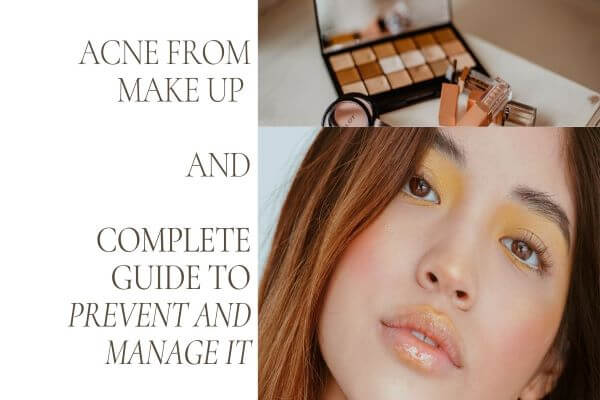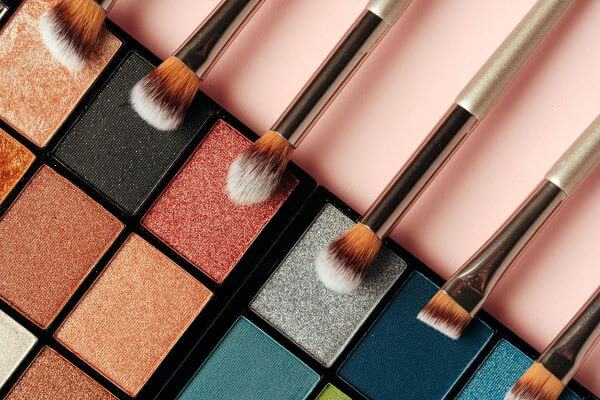
If you’re one of the many people out there who are struggling with acne, you may be wondering if your makeup routine is to blame. While it’s not always possible to avoid acne from makeup, there are a few things you can do to minimize their appearance.
In this post, we’ll explore some of the most common causes of acne, tiny bumps, or irritation from wearing makeup and offer tips on how to address them.
Keep reading to learn more!
Tell me the cause of acne.
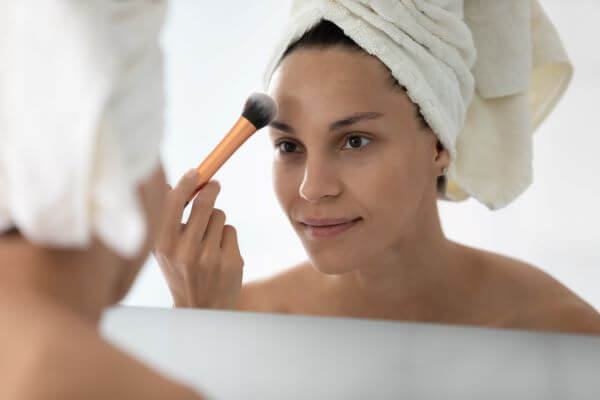
Acne is a skin condition that occurs when our pores become clogged with oil, dead skin cells, and bacteria.
The oil and bacteria can cause inflammation and redness, and the dead cells can make our pores appear larger.
The dead cells and sebum that form the plug are referred to as “closed comedones” or whiteheads. When the clogged pore remains open, an “open comedones” or blackhead appears.
Inflamed or infected forms of acne can develop when our hair follicles become plugged with sebum, dead cells, and bacteria, which may result in papules, pustules, nodules, or cysts.
Acne can be caused by a variety of factors, including hormones, stress, and genetics.
If you’re struggling with breakouts, it’s important to also take a close look at your beauty routine to see if there are any potential culprits.
What ingredients cause acne breakouts?
There are a few common acne-causing culprits (ingredients) in makeup that can cause acne breakouts.
One of the most common culprits is lanolin. Lanolin is a type of oil that is often used as an emollient or moisturizer in makeup products.
While it can help to keep your skin hydrated, it can also clog pores and lead to breakouts.
Another common ingredient that can cause breakouts is mineral oil. Mineral oil is a type of petroleum product that is often used in makeup to help control shine.
While it can be effective at controlling oil, it can also clog pores and lead to breakouts.
Finally, another ingredient that can cause acne is fragrance. Many makeup products contain synthetic fragrances, which can irritate the skin and lead to breakouts.
Acne cosmetica
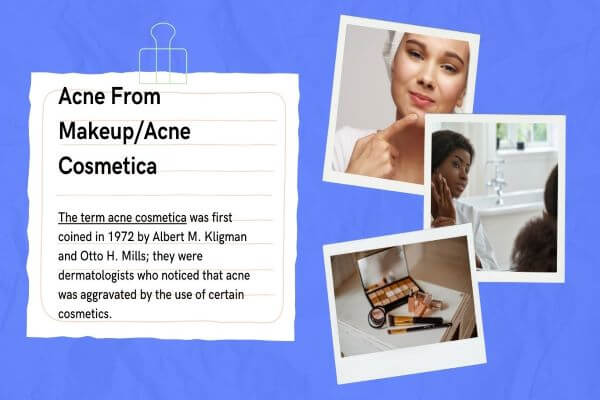
Acne cosmetica is a type of mild but persistent acne that is caused by the use of cosmetics.
The term acne cosmetica was first coined in 1972 by Albert M. Kligman and Otto H. Mills; they were dermatologists who noticed that acne was aggravated by the use of certain cosmetics.
Some people may find that their acne is worsened by certain types of makeup and their makeup routine.
What should a beauty routine look like?
There’s no one answer to this question since everyone’s skin is different and what works for one person might not work for another.
However, in general, a good beauty routine should involve;
- cleansing,
- toning,
- moisturizing your skin every day.
- and daily sunscreen.
You might also want to exfoliate a few times a week to remove dead skin cells and help your makeup go on more smoothly.
How does makeup give you acne?
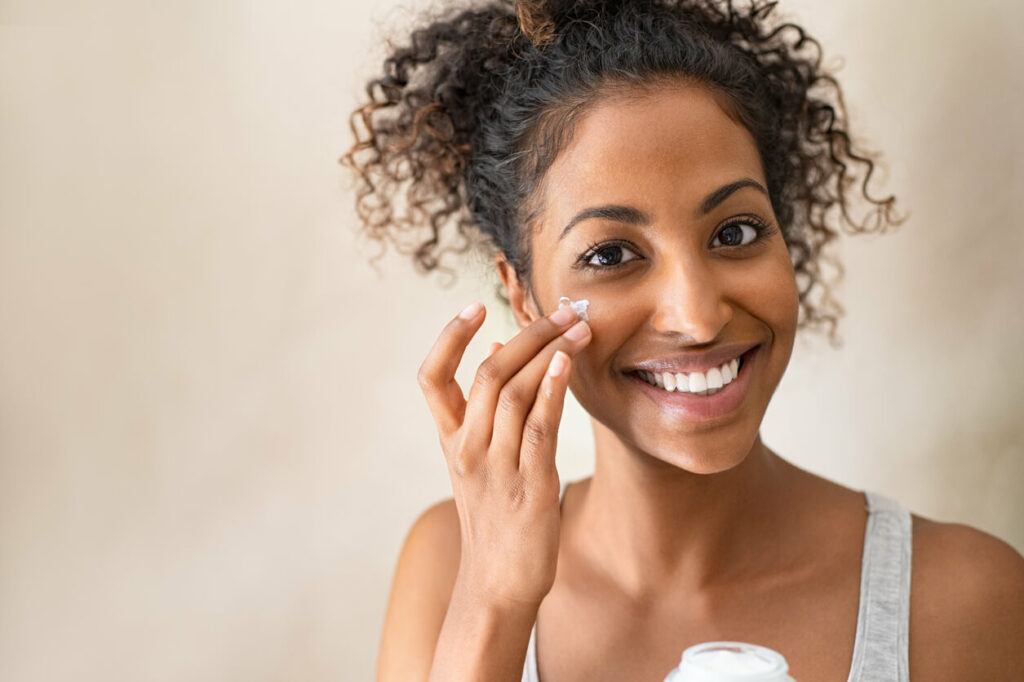
Let’s look at 1) how wearing makeup can cause acne, and 2) if everyone is prone to getting acne from applying makeup or not, and why that’s the case.
1) How can wearing makeup clog pores or cause acne?
It is vital to determine the different scenarios on how makeup causes acne;
- Acne causing bacteria:
Acne-causing bacteria thrive in warm, moist environments. When you wear makeup, you create the perfect conditions for acne-causing bacteria to grow.
- Dry acne skin and makeup:
When you have dry skin, as well as acne-prone and sensitive, using makeup can further dry out your skin, which can lead to the production of excess oil and clogged pores.
- Oily acne skin and makeup:
If you have oily skin that’s acne-prone, using oil-based makeup can clog your pores and lead to breakouts.
- Excess or heavy makeup and acne:
Wearing heavy makeup can also lead to acne, it can lead to clogged pores and the development of acne.
- When you sleep in your makeup:
When you sleep in your makeup, your pores become clogged and acne-causing bacteria are given the perfect environment to grow.
- How foundation causes acne:
Foundation can cause acne in two ways, 1) it can be too heavy and lead to clogged pores, or 2) it can irritate your skin.
2) Will I always have acne from makeup?
Makeup can indeed cause acne, but not on everyone’s face.
Most people will not develop acne from wearing makeup if they haven’t inherited the genetic predisposition to the disease.
How can I stop my makeup from causing acne?
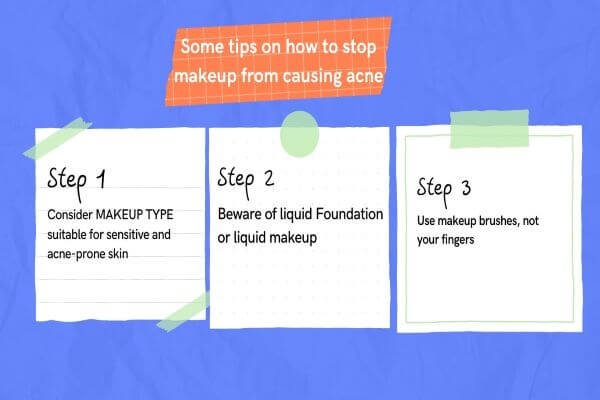
If wearing makeup is your thing, you can consider the following STEPS to help prevent it from causing acne;
Step 1: Consider suitable MAKEUP for sensitive and acne-prone skin
- Switch to products that won’t clog pores or irritate the skin
The first step is to identify what ingredients in your makeup are causing problems. If you’re not sure, consult a dermatologist or cosmetologist. They can help you figure out what’s causing your breakouts.
Dr. Lortscher, a board-certified dermatologist, recommends that selecting a foundation or makeup product should include a description: “non-comedogenic”, ” non-acnegenic.”
- Mineral-based makeup
Mineral-based product is a good option for people with acne who like to wear makeup. That’s because it doesn’t clog pores like other types of makeup. Minerals like zinc can also help calm irritation.
- Water-based makeup
Water-based makeup is another option to consider if you have acne. These products are less likely to be pore-clogging or cause breakouts.
- Powder foundation
Powder foundation or powder-based makeup may be a better option for you, as they are unlikely to clog pores and can help control shine.
Step 2: Beware of liquid Foundation or liquid makeup
If you have acne, you may want to avoid using liquid-based foundation or any other liquid makeup. These can be too heavy and can clog your pores, which can lead to breakouts.
Step 3: Use makeup brushes, not your fingers
When applying makeup, use brushes instead of your fingers. This will help to prevent the transfer of bacteria from your fingers to your face.
Step 4: Clean your makeup brushes
Make sure you regularly clean your makeup brushes. This will help to prevent the build-up of bacteria which can cause breakouts.
- How do you clean your brushes?
To clean your brushes, you can use a brush cleanser or shampoo. Wet the bristles and then massage the cleanser into the bristles. Rinse the brushes thoroughly and then allow them to air dry.
Step 5: Wash your face before applying makeup
Be sure to wash your face thoroughly before applying makeup. This will help remove any dirt, oil, or bacteria that could be on your skin.
Step 6: Avoid excess foundation or makeup
Third, Don’t go overboard with your foundation or makeup. Be sure to avoid wearing excess makeup, thereby reducing your risk of ending up with clogged pores.
Step 7: Remove makeup before bed
And fourth, don’t sleep in your makeup. Be sure to be makeup-free by removing all your makeup before you go to bed!
What to do with a full face of makeup:
- Remove your eye makeup first:
When it comes to removing a full face of makeup, you should always remove your makeup around the eye first. This will help to prevent any further irritation or damage to your delicate eye area.
- Use a gentle cleanser:
When removing the rest of your makeup, be sure to use a gentle cleanser. Harsh scrubs can damage your skin and make acne worse.
- Be gentle:
Remember, your skin is delicate, so be sure to handle it with care. Avoid scrubbing too hard, as this can irritate your skin and make acne worse.
- Use a soft cloth:
To remove your makeup, use a soft cloth or cotton pad. This will help to avoid any further irritation.
- Rinse with cool water:
After you’ve removed all your makeup, rinse your face with cool water. This will help to soothe your skin and reduce any redness or inflammation for acne patients.
Following these simple skin care tips, you can remove your makeup without causing acne.
Make up routine for acne-prone skin (hooray!)
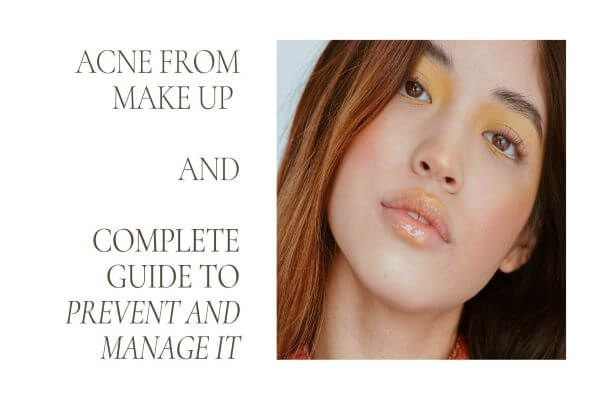
If you’re using non-comedogenic makeup and following these steps your acne is less likely to get worse.
- Get started with the cleaning up! Always clean your facial tissues before applying any makeup or apply makeup to it before applying it.
- This will help to remove any dirt, oil, or makeup that could be on your skin and cause clogging of pores.
- When it comes to foundation, always go for light coverage. A heavy foundation can end up clogging your pores and causing breakouts. If you have to use a full-coverage foundation, make sure to use a very light hand.
- Powder foundation is a great option for those with acne-prone skin. It’s less likely to cause your pores to clog than liquid foundation and it can help to control oil.
- If you’re using concealer, be sure to choose one that’s non-comedogenic. This will help to avoid clogging your pores.
- When it comes to eye makeup, go for waterproof options. This will help to avoid any smudging or smearing that could happen during the day.
- For blush and bronzer, look for powder formulas. These are less likely to cause breakouts than cream or liquid formulas.
- Finally, be sure to remove your makeup every night before bed.
- You can use brushes or makeup cleaners to remove makeup.
- Never give anyone else makeup. Share tools equal share in bacteria and oils. They’re no good for a lot of things, especially in the most attractive colors.
Sensitive skin: Tips for applying and removing makeup
You should know that makeup is not the root cause of acne. However, if you have sensitive skin, there are some things to consider before ditching your makeup routine altogether.
- Ingredients:
When it comes to sensitive skin, you want to be extra mindful of the ingredients in your makeup. Look for products that are non-comedogenic, which means they won’t clog your pores.
- Application:
How you apply your makeup can also make a difference. Make sure you’re using clean brushes to apply makeup gently on your face, and not applying too much pressure.
- Primer:
If you have sensitive skin, you may want to consider using a primer before applying your foundation. This can serve as a protective skin barrier.
- Removal:
Be sure to thoroughly remove your makeup at the end of the day. Use a gentle cleanser and avoid scrubbing your skin too harshly.
If you’re still experiencing breakouts after trying these tips, it may be time you held off on your makeup and contacted a dermatologist to determine the best course of action for your skin.
How to use salicylic acid to unclog pores
Salicylic acid (SA) is a common acne-fighting ingredient that can help unclog pores, prevent breakouts, and clear mild to moderate acne. You can find SA in many over-the-counter acne treatments.
To use SA to unclog pores:
- Start with a clean, dry face.
- Apply a small amount of SA acne treatment to the affected areas.
- Gently massage the product into your skin.
- Wait for the product to dry before applying makeup or sunscreen.
If you experience any irritation, stop using the product and talk to your dermatologist. Otherwise, you can use SA acne treatments as part of your regular acne prevention routine.
Our OTC product pick for treating acne cosmetica
Proactiv Solution® Acne treatment system Proactive provides highly-concentrated ingredients, such as benzoyl peroxide, into skin pores to reduce acne to achieve clear skin. But don’t just take it to heart! – read reviews!
Conclusion: Last, But Not Least!
There are several benefits to wearing makeup, such as helping to cover acne, hide redness, evening out skin tone, enhancing beauty, and increasing self-confidence.
However, an individual with an acne-prone skin type may want to take extra care to avoid causing further breakouts.
Consider seeing a dermatologist if your acne is moderate to severe or won’t go away with over-the-counter skin care products.
Finally, consider seeing your dermatologist or cosmetologist for help to identify the ingredients in your makeup that may be causing or aggravating your acne.
